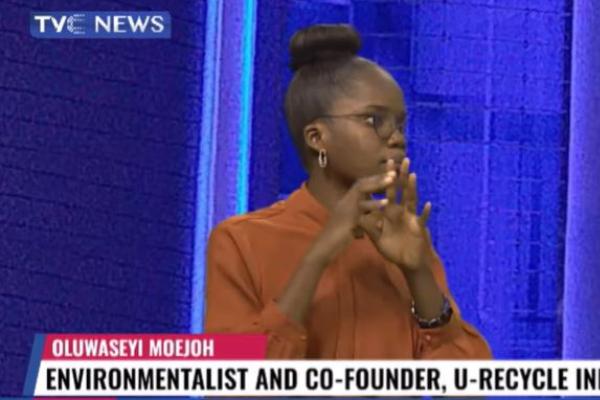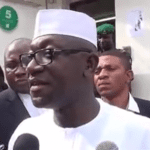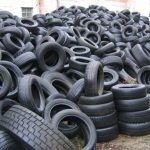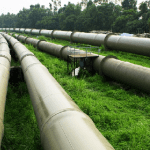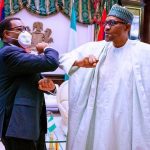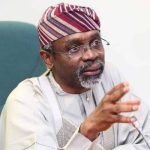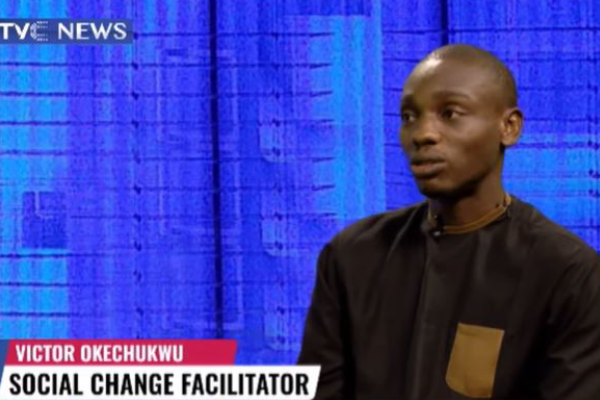As the year winds down, we are also reminded of the countdown to the 2030 Agenda for Sustainable Development adopted by all UN members in 2015.
There are eight years left before that much talked about UN sustainable goals of achieving peace and prosperity for the people and the planet but the big question is do we have enough time? Some would say our biggest hope and our brightest chance are in the youth in Nigeria.

They make up roughly 70% of the population, so nothing can be done without us. Well, at the heart of that vision are the global goals and 17 of them which serve as an audience call for action to all countries of the world.
And one thing that is key to achieving these goals by the deadline would be the active engagement of young people.
Speaking on youth dialogue for sustainable development, Oluwaseyi Moejoh, Environmentalist, Co-founder, U-Recycle initiative said on ThisMorning that what drives her passion is central to the issue of the problem of plastic pollution and climate change, the gaps that exist and the potential for so much impact.
Narrating how she started, Oluwaseyi said “I remember starting this when I was 16 years old, I was just trying to do my part in all of this big puzzle of the SDGs, Trying to see how I could do my bit to contribute to promoting awareness about it in my school, to launching solutions. And now it’s so hard for me to see how far we’ve grown over time.
” I got to learn about the SDG when i was selected as an ambassador for the SDG Six, and that’s clean water and sanitation, I got to hear stories of how people didn’t have access to water in the morning, how they couldn’t drink clean water. And I was really moved to see how I could start something in my school to solve this problem.
“From starting something in my immediate community, I began to see how I can keep growing and in the process, get more youth to join me on this wonderful journey, and it’s been four to five years now of launching projects across different communities and cities in Africa.
According to her, one thing stays central which is that the power of youth is really transformational.
She noted that so much can come from the brains, the minds, the energy of youth.
“We need to sit on the table, we are ready for this, and we are still hoping for a better future. However, it’s so central that our voices are valued, not just heard, but valued, our contributions are seen and recognised, and we are supported beyond just funding, but also platforms to continually push for transformative change here in Nigeria and across Africa.
Oluwaseyi added that it is very important that we begin to ask questions as to where Nigeria is right now, and the world at large, What have we done and what needs to be done? And it’s also important that we factor context because what applies here in Nigeria may not apply globally.
As the year winds down, we are also reminded of the countdown to the 2030 Agenda for Sustainable Development adopted by all UN members in 2015.
There are eight years left before that much talked about UN sustainable goals of achieving peace and prosperity for the people and the planet but the big question is do we have enough time? Some would say our biggest hope and our brightest chance are in the youth in Nigeria.

They make up roughly 70% of the population, so nothing can be done without us. Well, at the heart of that vision are the global goals and 17 of them which serve as an audience call for action to all countries of the world.
And one thing that is key to achieving these goals by the deadline would be the active engagement of young people.
Speaking on youth dialogue for sustainable development, Oluwaseyi Moejoh, Environmentalist, Co-founder, U-Recycle initiative said on ThisMorning that what drives her passion is central to the issue of the problem of plastic pollution and climate change, the gaps that exist and the potential for so much impact.
Narrating how she started, Oluwaseyi said “I remember starting this when I was 16 years old, I was just trying to do my part in all of this big puzzle of the SDGs, Trying to see how I could do my bit to contribute to promoting awareness about it in my school, to launching solutions. And now it’s so hard for me to see how far we’ve grown over time.
” I got to learn about the SDG when i was selected as an ambassador for the SDG Six, and that’s clean water and sanitation, I got to hear stories of how people didn’t have access to water in the morning, how they couldn’t drink clean water. And I was really moved to see how I could start something in my school to solve this problem.
“From starting something in my immediate community, I began to see how I can keep growing and in the process, get more youth to join me on this wonderful journey, and it’s been four to five years now of launching projects across different communities and cities in Africa.
According to her, one thing stays central which is that the power of youth is really transformational.
She noted that so much can come from the brains, the minds, the energy of youth.
“We need to sit on the table, we are ready for this, and we are still hoping for a better future. However, it’s so central that our voices are valued, not just heard, but valued, our contributions are seen and recognised, and we are supported beyond just funding, but also platforms to continually push for transformative change here in Nigeria and across Africa.
Oluwaseyi added that it is very important that we begin to ask questions as to where Nigeria is right now, and the world at large, What have we done and what needs to be done? And it’s also important that we factor context because what applies here in Nigeria may not apply globally.
As the year winds down, we are also reminded of the countdown to the 2030 Agenda for Sustainable Development adopted by all UN members in 2015.
There are eight years left before that much talked about UN sustainable goals of achieving peace and prosperity for the people and the planet but the big question is do we have enough time? Some would say our biggest hope and our brightest chance are in the youth in Nigeria.

They make up roughly 70% of the population, so nothing can be done without us. Well, at the heart of that vision are the global goals and 17 of them which serve as an audience call for action to all countries of the world.
And one thing that is key to achieving these goals by the deadline would be the active engagement of young people.
Speaking on youth dialogue for sustainable development, Oluwaseyi Moejoh, Environmentalist, Co-founder, U-Recycle initiative said on ThisMorning that what drives her passion is central to the issue of the problem of plastic pollution and climate change, the gaps that exist and the potential for so much impact.
Narrating how she started, Oluwaseyi said “I remember starting this when I was 16 years old, I was just trying to do my part in all of this big puzzle of the SDGs, Trying to see how I could do my bit to contribute to promoting awareness about it in my school, to launching solutions. And now it’s so hard for me to see how far we’ve grown over time.
” I got to learn about the SDG when i was selected as an ambassador for the SDG Six, and that’s clean water and sanitation, I got to hear stories of how people didn’t have access to water in the morning, how they couldn’t drink clean water. And I was really moved to see how I could start something in my school to solve this problem.
“From starting something in my immediate community, I began to see how I can keep growing and in the process, get more youth to join me on this wonderful journey, and it’s been four to five years now of launching projects across different communities and cities in Africa.
According to her, one thing stays central which is that the power of youth is really transformational.
She noted that so much can come from the brains, the minds, the energy of youth.
“We need to sit on the table, we are ready for this, and we are still hoping for a better future. However, it’s so central that our voices are valued, not just heard, but valued, our contributions are seen and recognised, and we are supported beyond just funding, but also platforms to continually push for transformative change here in Nigeria and across Africa.
Oluwaseyi added that it is very important that we begin to ask questions as to where Nigeria is right now, and the world at large, What have we done and what needs to be done? And it’s also important that we factor context because what applies here in Nigeria may not apply globally.
As the year winds down, we are also reminded of the countdown to the 2030 Agenda for Sustainable Development adopted by all UN members in 2015.
There are eight years left before that much talked about UN sustainable goals of achieving peace and prosperity for the people and the planet but the big question is do we have enough time? Some would say our biggest hope and our brightest chance are in the youth in Nigeria.

They make up roughly 70% of the population, so nothing can be done without us. Well, at the heart of that vision are the global goals and 17 of them which serve as an audience call for action to all countries of the world.
And one thing that is key to achieving these goals by the deadline would be the active engagement of young people.
Speaking on youth dialogue for sustainable development, Oluwaseyi Moejoh, Environmentalist, Co-founder, U-Recycle initiative said on ThisMorning that what drives her passion is central to the issue of the problem of plastic pollution and climate change, the gaps that exist and the potential for so much impact.
Narrating how she started, Oluwaseyi said “I remember starting this when I was 16 years old, I was just trying to do my part in all of this big puzzle of the SDGs, Trying to see how I could do my bit to contribute to promoting awareness about it in my school, to launching solutions. And now it’s so hard for me to see how far we’ve grown over time.
” I got to learn about the SDG when i was selected as an ambassador for the SDG Six, and that’s clean water and sanitation, I got to hear stories of how people didn’t have access to water in the morning, how they couldn’t drink clean water. And I was really moved to see how I could start something in my school to solve this problem.
“From starting something in my immediate community, I began to see how I can keep growing and in the process, get more youth to join me on this wonderful journey, and it’s been four to five years now of launching projects across different communities and cities in Africa.
According to her, one thing stays central which is that the power of youth is really transformational.
She noted that so much can come from the brains, the minds, the energy of youth.
“We need to sit on the table, we are ready for this, and we are still hoping for a better future. However, it’s so central that our voices are valued, not just heard, but valued, our contributions are seen and recognised, and we are supported beyond just funding, but also platforms to continually push for transformative change here in Nigeria and across Africa.
Oluwaseyi added that it is very important that we begin to ask questions as to where Nigeria is right now, and the world at large, What have we done and what needs to be done? And it’s also important that we factor context because what applies here in Nigeria may not apply globally.
As the year winds down, we are also reminded of the countdown to the 2030 Agenda for Sustainable Development adopted by all UN members in 2015.
There are eight years left before that much talked about UN sustainable goals of achieving peace and prosperity for the people and the planet but the big question is do we have enough time? Some would say our biggest hope and our brightest chance are in the youth in Nigeria.

They make up roughly 70% of the population, so nothing can be done without us. Well, at the heart of that vision are the global goals and 17 of them which serve as an audience call for action to all countries of the world.
And one thing that is key to achieving these goals by the deadline would be the active engagement of young people.
Speaking on youth dialogue for sustainable development, Oluwaseyi Moejoh, Environmentalist, Co-founder, U-Recycle initiative said on ThisMorning that what drives her passion is central to the issue of the problem of plastic pollution and climate change, the gaps that exist and the potential for so much impact.
Narrating how she started, Oluwaseyi said “I remember starting this when I was 16 years old, I was just trying to do my part in all of this big puzzle of the SDGs, Trying to see how I could do my bit to contribute to promoting awareness about it in my school, to launching solutions. And now it’s so hard for me to see how far we’ve grown over time.
” I got to learn about the SDG when i was selected as an ambassador for the SDG Six, and that’s clean water and sanitation, I got to hear stories of how people didn’t have access to water in the morning, how they couldn’t drink clean water. And I was really moved to see how I could start something in my school to solve this problem.
“From starting something in my immediate community, I began to see how I can keep growing and in the process, get more youth to join me on this wonderful journey, and it’s been four to five years now of launching projects across different communities and cities in Africa.
According to her, one thing stays central which is that the power of youth is really transformational.
She noted that so much can come from the brains, the minds, the energy of youth.
“We need to sit on the table, we are ready for this, and we are still hoping for a better future. However, it’s so central that our voices are valued, not just heard, but valued, our contributions are seen and recognised, and we are supported beyond just funding, but also platforms to continually push for transformative change here in Nigeria and across Africa.
Oluwaseyi added that it is very important that we begin to ask questions as to where Nigeria is right now, and the world at large, What have we done and what needs to be done? And it’s also important that we factor context because what applies here in Nigeria may not apply globally.
As the year winds down, we are also reminded of the countdown to the 2030 Agenda for Sustainable Development adopted by all UN members in 2015.
There are eight years left before that much talked about UN sustainable goals of achieving peace and prosperity for the people and the planet but the big question is do we have enough time? Some would say our biggest hope and our brightest chance are in the youth in Nigeria.

They make up roughly 70% of the population, so nothing can be done without us. Well, at the heart of that vision are the global goals and 17 of them which serve as an audience call for action to all countries of the world.
And one thing that is key to achieving these goals by the deadline would be the active engagement of young people.
Speaking on youth dialogue for sustainable development, Oluwaseyi Moejoh, Environmentalist, Co-founder, U-Recycle initiative said on ThisMorning that what drives her passion is central to the issue of the problem of plastic pollution and climate change, the gaps that exist and the potential for so much impact.
Narrating how she started, Oluwaseyi said “I remember starting this when I was 16 years old, I was just trying to do my part in all of this big puzzle of the SDGs, Trying to see how I could do my bit to contribute to promoting awareness about it in my school, to launching solutions. And now it’s so hard for me to see how far we’ve grown over time.
” I got to learn about the SDG when i was selected as an ambassador for the SDG Six, and that’s clean water and sanitation, I got to hear stories of how people didn’t have access to water in the morning, how they couldn’t drink clean water. And I was really moved to see how I could start something in my school to solve this problem.
“From starting something in my immediate community, I began to see how I can keep growing and in the process, get more youth to join me on this wonderful journey, and it’s been four to five years now of launching projects across different communities and cities in Africa.
According to her, one thing stays central which is that the power of youth is really transformational.
She noted that so much can come from the brains, the minds, the energy of youth.
“We need to sit on the table, we are ready for this, and we are still hoping for a better future. However, it’s so central that our voices are valued, not just heard, but valued, our contributions are seen and recognised, and we are supported beyond just funding, but also platforms to continually push for transformative change here in Nigeria and across Africa.
Oluwaseyi added that it is very important that we begin to ask questions as to where Nigeria is right now, and the world at large, What have we done and what needs to be done? And it’s also important that we factor context because what applies here in Nigeria may not apply globally.
As the year winds down, we are also reminded of the countdown to the 2030 Agenda for Sustainable Development adopted by all UN members in 2015.
There are eight years left before that much talked about UN sustainable goals of achieving peace and prosperity for the people and the planet but the big question is do we have enough time? Some would say our biggest hope and our brightest chance are in the youth in Nigeria.

They make up roughly 70% of the population, so nothing can be done without us. Well, at the heart of that vision are the global goals and 17 of them which serve as an audience call for action to all countries of the world.
And one thing that is key to achieving these goals by the deadline would be the active engagement of young people.
Speaking on youth dialogue for sustainable development, Oluwaseyi Moejoh, Environmentalist, Co-founder, U-Recycle initiative said on ThisMorning that what drives her passion is central to the issue of the problem of plastic pollution and climate change, the gaps that exist and the potential for so much impact.
Narrating how she started, Oluwaseyi said “I remember starting this when I was 16 years old, I was just trying to do my part in all of this big puzzle of the SDGs, Trying to see how I could do my bit to contribute to promoting awareness about it in my school, to launching solutions. And now it’s so hard for me to see how far we’ve grown over time.
” I got to learn about the SDG when i was selected as an ambassador for the SDG Six, and that’s clean water and sanitation, I got to hear stories of how people didn’t have access to water in the morning, how they couldn’t drink clean water. And I was really moved to see how I could start something in my school to solve this problem.
“From starting something in my immediate community, I began to see how I can keep growing and in the process, get more youth to join me on this wonderful journey, and it’s been four to five years now of launching projects across different communities and cities in Africa.
According to her, one thing stays central which is that the power of youth is really transformational.
She noted that so much can come from the brains, the minds, the energy of youth.
“We need to sit on the table, we are ready for this, and we are still hoping for a better future. However, it’s so central that our voices are valued, not just heard, but valued, our contributions are seen and recognised, and we are supported beyond just funding, but also platforms to continually push for transformative change here in Nigeria and across Africa.
Oluwaseyi added that it is very important that we begin to ask questions as to where Nigeria is right now, and the world at large, What have we done and what needs to be done? And it’s also important that we factor context because what applies here in Nigeria may not apply globally.
As the year winds down, we are also reminded of the countdown to the 2030 Agenda for Sustainable Development adopted by all UN members in 2015.
There are eight years left before that much talked about UN sustainable goals of achieving peace and prosperity for the people and the planet but the big question is do we have enough time? Some would say our biggest hope and our brightest chance are in the youth in Nigeria.

They make up roughly 70% of the population, so nothing can be done without us. Well, at the heart of that vision are the global goals and 17 of them which serve as an audience call for action to all countries of the world.
And one thing that is key to achieving these goals by the deadline would be the active engagement of young people.
Speaking on youth dialogue for sustainable development, Oluwaseyi Moejoh, Environmentalist, Co-founder, U-Recycle initiative said on ThisMorning that what drives her passion is central to the issue of the problem of plastic pollution and climate change, the gaps that exist and the potential for so much impact.
Narrating how she started, Oluwaseyi said “I remember starting this when I was 16 years old, I was just trying to do my part in all of this big puzzle of the SDGs, Trying to see how I could do my bit to contribute to promoting awareness about it in my school, to launching solutions. And now it’s so hard for me to see how far we’ve grown over time.
” I got to learn about the SDG when i was selected as an ambassador for the SDG Six, and that’s clean water and sanitation, I got to hear stories of how people didn’t have access to water in the morning, how they couldn’t drink clean water. And I was really moved to see how I could start something in my school to solve this problem.
“From starting something in my immediate community, I began to see how I can keep growing and in the process, get more youth to join me on this wonderful journey, and it’s been four to five years now of launching projects across different communities and cities in Africa.
According to her, one thing stays central which is that the power of youth is really transformational.
She noted that so much can come from the brains, the minds, the energy of youth.
“We need to sit on the table, we are ready for this, and we are still hoping for a better future. However, it’s so central that our voices are valued, not just heard, but valued, our contributions are seen and recognised, and we are supported beyond just funding, but also platforms to continually push for transformative change here in Nigeria and across Africa.
Oluwaseyi added that it is very important that we begin to ask questions as to where Nigeria is right now, and the world at large, What have we done and what needs to be done? And it’s also important that we factor context because what applies here in Nigeria may not apply globally.

